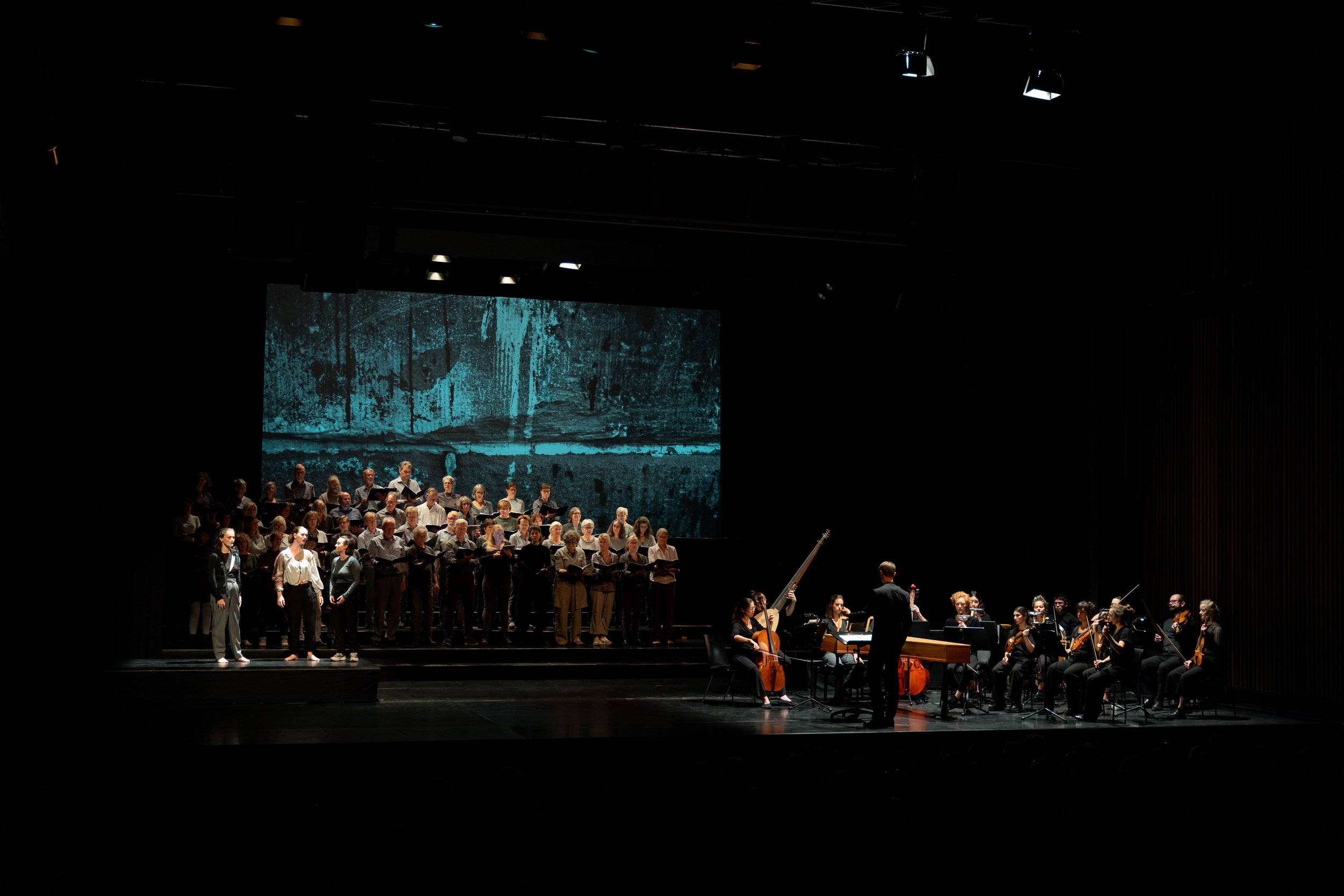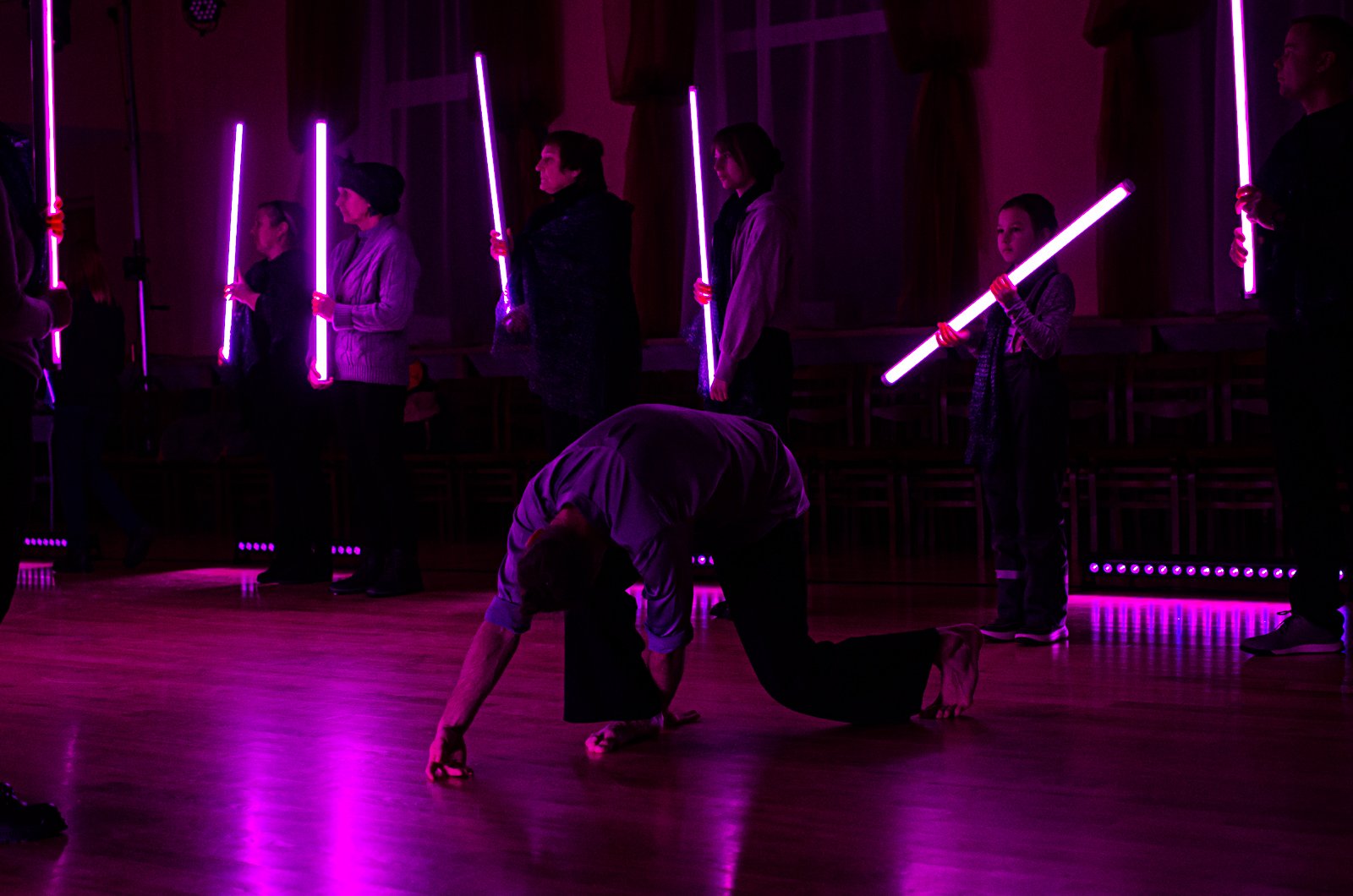
Community engaged projects
"In the spotlight of community theatre, every individual becomes a storyteller, and together, we weave the vibrant tapestry of our shared narratives."
“Midsummer nights dream“
Taking place in the enchanting Pokaiņi Forest during the magical summer, the performance promises to be a sensory journey of emotions, light, and sound. Incorporating elements of theater, contemporary dance, and aerial dance, it will conjure a true solstice-time mystery. One of Shakespeare's most famous works is transformed into a promenade format, allowing the audience to experience the magic of love, the world of humans and fairies, the mythical, and the real.
-
French director Emma Battesti is creating an unprecedented cultural event in the Pokaiņi Forest—a promenade performance titled "SAPNIS SAULGRIEŽU NAKTĪ" inspired by motifs from William Shakespeare's play "A Midsummer Night's Dream." The performance is developed around Latvian stories, blending Shakespeare with the local context as he encounters the spirit of Blaumanis. This community theater project involves collaboration between the local community and professional artists.
Within the performance, Latvian contemporary dance artists will present an aerial dance performance for the first time. Inspired by circus aerial acrobatics, this specially choreographed piece by Jānis Putniņš will bring the forest trees to life.
Creative Team:
Director: Emma Battesti (FRA)
Producers: Ieva Niedre, Initium
Choreographer: Jānis Putniņš
Set Design: Meža Eva, Radi vidi
Dramaturges: William Shakespeare, Luke Welch (UK)
Costume Designers: Marta Grosberga, Brigita Stroda
Assistant Director: Dita Leinerte
Featuring: Local community actors
The performance is part of the LV100 program and is supported by the Latvian National Cultural Center, British Council Latvia, and the Dobele Municipality. Sponsors include DOBELES AUTOBUSU PARKS, Pilsētas Māja - Viesu nams Dobelē, Latvijas valsts mežu vēstniecība, and Dobeles dzirnavnieks.
“Surviving Monday”
Based on true events, the narrative explores the boundaries of interpersonal relationships among young people, the influence of one over the other, and the possibilities that lie within. The performance raises thought-provoking questions for the audience—how little is needed to destroy a person, and is it possible to find a way back after impacting someone else's life?
-
In the framework of Latvia's centenary project "Latvian Stories: Shakespeare Meets Blaumanis," which has successfully brought community theater traditions to various regions, a new production is announced—the utopian opera "(Iz)dzīvot pirmdienu" (Surviving Monday). The premiere of the performance is scheduled for December 6th at the Rīga State Technical School sports hall, as reported by the creators on the "Delfi" portal.
Renowned for his work on various youth-related themes, director Edgars Niklasons, nominated for the "Spēlmaņu nakts 2018/2019" award in the category "Best Children's Play" for "Spokuskopija," leads this latest production.
Based on true events, the narrative explores the boundaries of interpersonal relationships among young people, the influence of one over the other, and the possibilities that lie within. The performance raises thought-provoking questions for the audience—how little is needed to destroy a person, and is it possible to find a way back after impacting someone else's life?
Set in a sports class where individuals are vulnerable, feeling their shortcomings or, conversely, confidently showcasing their abilities, the opera utilizes a real school sports hall, complete with actual equipment. Audience members, donning sports shoes before entering the hall, become part of the game. To enhance the context of the action, musician Goran Gora has created a musical score specifically for this production. The title of the utopian opera perfectly suits the continuous emotional whirlwind that director Niklasons brings to life.
"Latvian Stories: Shakespeare Meets Blaumanis" is a community theater project that collaborates with local communities and involves professional artists such as Jans Villems van den Boss (UK), Emma Battesti (FR), Baņuta Rubess, Dmitrijs Petrenko, the "Perforācija" collective, contemporary dance choreographers Eva Kronberga, Alise Putniņa, Jānis Putniņš, dramaturgs Edgars Niklasons, Sandija Santa, Luke Welch (UK), composer Jēkabs Nīmanis, and others. The project has staged more than 10 performances in various Latvian regions, engaging over 400 participants.
Cast: Artūrs Putniņš, Rūdolfs Apse, Anastasija Rekuta Džordževiča, Igors Nazarenko, Malgožata Apse, and youth from different Latvian schools. The performance features the "Teika" chamber orchestra, conducted by Kārlis Rihards Ostrovskis.
Director, dramaturg: Edgars Niklasons. Dramaturgical consultant: Una Lekuze. Choreographer: Jānis Putniņš. Music composer: Goran Gora. Produced by the "Initium" foundation.

“SATEKA “
"Sateka" is a community-engaged applied contemporary theatre piece that delves into profound themes of mortality, change, and the intercultural significance of marriage as a symbol of new beginnings. This transformative production features original dramaturgy, meticulously crafted to shine a spotlight on the subjects of death and rebirth, the pivotal moment when something metamorphoses, taking on a new form.
-
"Sateka" is a community-engaged applied contemporary theatre piece that delves into profound themes of mortality, change, and the intercultural significance of marriage as a symbol of new beginnings. This transformative production features original dramaturgy, meticulously crafted to shine a spotlight on the subjects of death and rebirth, the pivotal moment when something metamorphoses, taking on a new form.
The title "Sateka" holds special significance as it originates from the Latvian language, where it signifies the point where two rivers converge, uniting and forging a singular path forward. This metaphor encapsulates the heart of the project, emphasizing the unity and continuity that arise from moments of change and transition.
The project is deeply rooted in the local community of Pededze, where a recently closed school had left an indelible mark. "Sateka" serves as a poignant exploration of this significant chapter in the village's history. It offers a platform for the community to collectively reflect on their past, embrace the present, and envision a promising future.
-
Directed by Edgars Niklasons, "Sateka" is a testament to his commitment to using the performing arts as a means of conveying complex human experiences and fostering a sense of togetherness. With a profound understanding of the project's themes, Niklasons leads the creative team in the creation of a powerful and evocative narrative.
Janis Putnins, serving as both the choreographer and dramaturgy consultant, lends his expertise to the project, infusing it with a captivating blend of movement, emotion, and storytelling.
The project features exceptional professional dancers, Aigars Larionovs and Lelde Kuznecova, who deliver performances that amplify the emotional resonance of the story.
In a unique and community-focused approach, "Sateka" also includes members of the Pededze community as performers. Their participation not only provides an authentic and intimate perspective on the narrative but also strengthens the bonds within the community itself.
"Sateka" was made possible through the generous support of various organizations, including the Latvian Culture Capital, Immaterial Cultural Preservation Foundation, and the dedicated production efforts of "INITIUM."
This project is more than just a performance; it is a journey of reflection, unity, and transformation. It serves as a catalyst for the community to explore their history, embrace change, and discover the potential for rebirth and new beginnings. "Sateka" embodies the power of the arts to inspire and connect people, leaving an indelible mark on both the performers and the audience, as they embark on this emotional and transformative journey together.
“LETTI“
The audience becomes an integral part of the performance, intimately experiencing six interconnected stories set in various locations within the Āraiši Archaeological Park. The narrative transports spectators back to the times when the first universal understandings of the world emerged. By directly participating in the production, viewers become witnesses to moments that echo the natural presence and communal spirit that has shaped and continues to shape the people of Latvia.
-
A promenade performance in the Āraiši Archaeological Park, part of Latvia's centenary community theater project "From Shakespeare to Blaumanis," is set to captivate audiences. Directed by Beatrise Zaķe, the show unfolds against the picturesque backdrop of the archaeological park, creating a unique and immersive experience.
The production boasts a talented team with Pamela Butāne handling the scenography, Sandija Santa contributing to the dramaturgy, and Jānis Strapcāns composing the music. Movement guidance comes from Jānis Putniņš, while Reinis Smiltenis (Those Guys Lighting) takes charge of the lighting design. The narrative is voiced by Inga Siliņa.
Featuring the newly formed community theater of Āraiši Archaeological Park, dance groups from Amata district and Cēsis city, choirs, and youth guards, the performance delves into the impact of history on modern individuals. The storyline unfolds through the experiences of five young people during a full moon night, deemed energetically potent and emotionally charged.
The audience becomes an integral part of the performance, intimately experiencing six interconnected stories set in various locations within the Āraiši Archaeological Park. The narrative transports spectators back to the times when the first universal understandings of the world emerged. By directly participating in the production, viewers become witnesses to moments that echo the natural presence and communal spirit that has shaped and continues to shape the people of Latvia.
Throughout the performance, the Āraiši Archaeological Park transforms into a dynamic platform, involving over a hundred participants and solidifying its place as one of the most extensive community theater productions in Latvia's project "From Shakespeare to Blaumanis."
"Dejo dejo dejo" is a play with genre boundaries. Both the format of the performance/exhibition and the inviting space of The Mill collaborative venue, along with the non-professional dancers, offer a perspective different from the usual. The performance/exhibition is also suitable for audiences without prior knowledge of contemporary dance etiquette.
“Dance Dance Dance”
-
The central theme of the performance/exhibition revolves around the significance of movement—how its meaning transforms through nuances, the strength of touch, the speed of a step, and the directness of gaze. Spectators will have the opportunity to observe a process in which ten dancers seek a genuine and revealing way to speak the contemporary language of dance about beauty found in both anger, sadness, and joy.
Choreographed by Santa Grīnfelde, with co-choreographer Jānis Putniņš, and performed by participants from the creative workshop "Eju Dzīvot Deju" second cycle - Eva Ikstena, Agnese Marcinkeviča, Sanita Sileniece, Inese Lipska, Alija Turlaja, Elīna Umbraško, Aija Pāsa, Kristīne Paula, Nora Suškēviča, Austra Ziļicka - ten non-professional dancers with and without experience in contemporary dance. The set design will be crafted by artist Krista Ose, costumes by costume designer Katrīna Virziņa, and lighting by lighting designer Andrējs Krūmiņš.